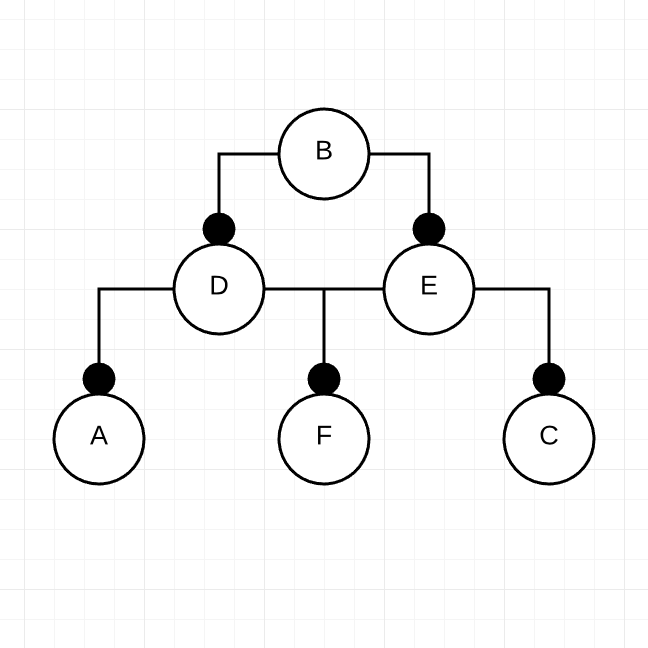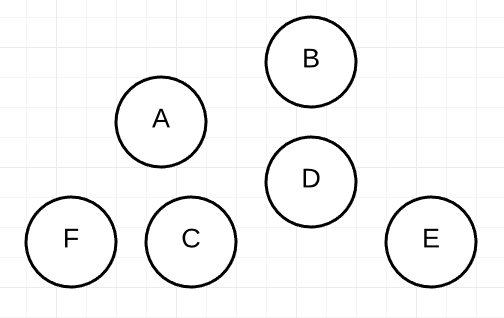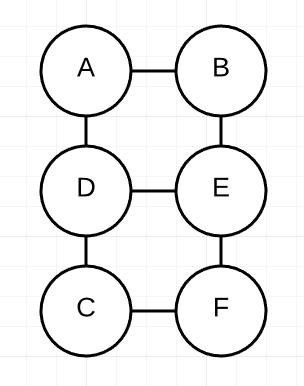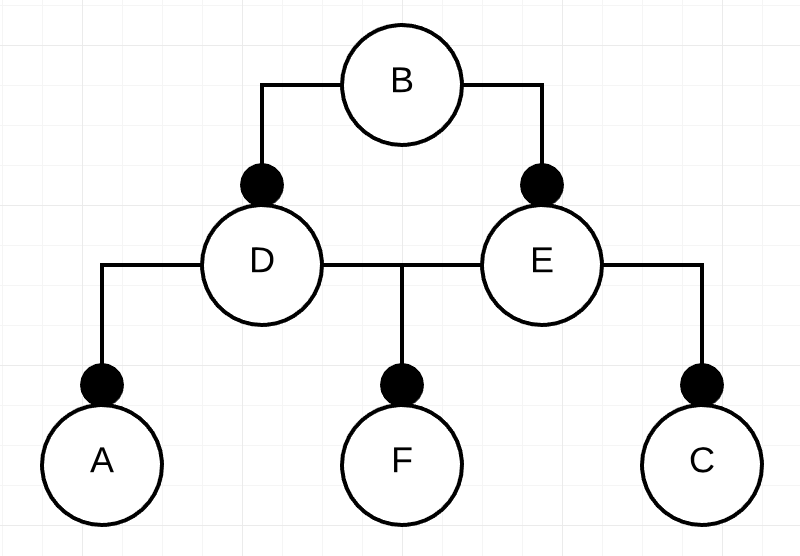
In Defence of the Hierarchy
Why is it that so many people are trying to get rid of hierarchies in the context of social systems? Hierarchies are essentially bad, it seems. Poor hierarchies :-( Because I think this is all a big misunderstanding. To me a hierarchy is a very simple, neutral, empty thing: a name for a structure. To me it's not laden with notions of subordination, oppression, micro-management.
Structuring things
Here is an assembly of "things":

The only relation between the "things" is they got picked maybe from a larger set and placed here. They are all equal members of the assembly.
Given an assembly I can structure its members, i.e. I can set up relations of some kind between them, e.g. I can create a sequence.

Or I can create an array:

Or... I can create a hierarchy:

So, what's making this kind of structure bad all of a sudden?
Is it the limited number of relationships between elements? No. That's what structures are about: a certain number of limited relationships.
Is it the kind of relationships? Yes! In a hierarchy they are not symmetric anymore. That's what lets the following structures differ:

And that's considered bad for some reason. Because, well... I don't know. Because it's limiting? Symmetry is egalitarian, asymmetry is oppressive?
Here's some other way to depict the same hierarchy:

Do you like that more?
Why can't hierarchy just be seen as a tool? As one of many possible structures for an assembly of elements, a means to some end. Sometimes a hierarchy is the appropriate structure, sometimes it's not.
Of course hierarchies have been misused and overused to organize people. They can be used in a wrong way like any tool. But that does not make them inherently bad and to be shunned.
Useful hierarchies
Without hierarchy there is no abstraction. Without hierarchy there are no black boxes. Without hierarchy there is no composition.
organism/human being/employee/software developer/GUI specialist – that's a hierarchy of abstractions (categories). What's so bad about it? It gives order to some aspect of the world.
company/team/member – that's a hierarchy of black boxes. What's so bad about it? If you like self-organization you need to love clear boundaries. Because in order to self-organize you need to be clear about your identity first which requires you to distinguish between inside and outside. And sure you don't want just any outside entity to see what's on the inside, let alone directly influence it. Example: if you decide to use a personal kanban board to get organized in order to be a reliable team member... well, you want others not to care about such detail. They are supposed to view you as a reliable black box. The same is true for your religious beliefs or whether you're married or like to cook pasta. You want to be a black box with a certain contract with other black boxes. And that's also true for the team you're working in as well as the company the team is part of. It's black boxes all the way down :-) Or, why not say: it's a hierarchy of black boxes?
Mind you, I'm just talking about basic structure. I'm not talking about the details of the contracts between black boxes on the same level of the hierarchy, e.g. between teams or between companies. I'm focussing on the nesting of black boxes. They are of different size and their elements are of different kinds.
company(sales team(account manager, sales person), software development team(product owner, developer, tester), support team(1st level supporter, 2nd level supporter), ...) – that's a hierarchy of composites. Each level is a whole made up of parts. The whole-part-relationship is essentially asymmetric. There's no way around a hierarchical structure here. Is that bad? The question itself seems to be bollocks. It's simply the nature of things.
Whether you think a software development team should be present at all in a company, or whether its parts should be like above... well, that's up to you. Whether you want the tester to closely communicate with the sales person or not... well, that's up to you. I'm not saying, there can be only a single hierarchy among the elements of an assembly. I'm just saying hierarchies are not bad, and they are inevitable if we want to hold a grip on the world of the many "things".
Whenever there is a large number of elements we're simply not good at "keeping them in our head" without structuring them in a hierarchy.
Compare this:

to that:

The first picture can be labled with "chaos" ;-) or "high entropy".
The second picture can be labled with "structured view" or... "hierarchy".
Hierarchy brings a certain order to a world of otherwise hardly manageable elements.
Yes, hierarchy thereby reduces what is there in some way. But that's the point. It's like a knife cutting apart a large pizza. Because a ø28cm pizza is not fit for immediate digestion. You can't handle it in one piece. You need to cut it up and also chew it.
Yes, reality, nature is more than just a single simple hierarchy. Yes, companies would be organized in too simple a manner, if there was just a single hierarchy. But to deny the utility of hierarchies does not look like a solution to any organizational problem to me.
And again: hierarchy is just a name for a certain class of structures with asymmetric relationships between the elements. Don't overload it with meaning. To call it by any other name, e.g. tree or recursive structure, in my view makes it harder to talk about it. Trees are the organisms forming a forest. (Ha! Again a hierarchy, a composite :-) ) Many people won't understand you if you said "Hierarchies are bad, but it's ok to have certain trees in your company." ;-) And "recursive structure" sounds too sophisticated to many people and requires the structure to be, well, recursive, i.e. self-similar, which I find limiting.
Yes, hierarchies are recursive structures in essence. But when you talk about company/team/member or company/process/activity the differences between the nesting levels of the recursive structure to me seem more important than the universal whole/part relationship. So I'd say it's more helpful to talk about hierarchies.
To me a hierarchy is just basic structure like a network. I can think of the term "hierarchy" being devoid of images of oppressed people, of command&control, of micro-management. Can you?
If you're against hierarchies in organizations, I guess what you mean is, you're against micro-management, you're in favor of self-organization, you're trying to find better ways to deal with the complexity of the markets than through strict command&control relationships starting from the god-like tip of the enterprise pyramide, the CEO. That's all well. We're on the same page.
But I don't think it will help the cause to shout "Let's get rid of hierarchies!" The earth is not flat, neither can be organizations of a certain size. The question should not be if hierarchies or not, but what kind of hierarchies. Which hierarchies does an organization need, what are beneficial forms of hierarchies? Yes, also how deep should hierarchies be.
My guess is, if "Get rid of hierarchies!" is the battle cry that's furthering a cargo cult of "non-hierarchy". And it's throwing out the baby with the bath water. And it will run against human's cognitive nature. Sooner than later the battle will hit an inexplicable wall. Wondering why things don't work out like they should. Or wondering why there are still hierarchies around - unwanted and informal ones of course.
But maybe I'm completely wrong. Maybe I don't have a clue what hierarchies are about and you understand the whole thing much better. Well, then I happily assume my position on a lower level of the hierarchy of knowledge on this topic :-)
